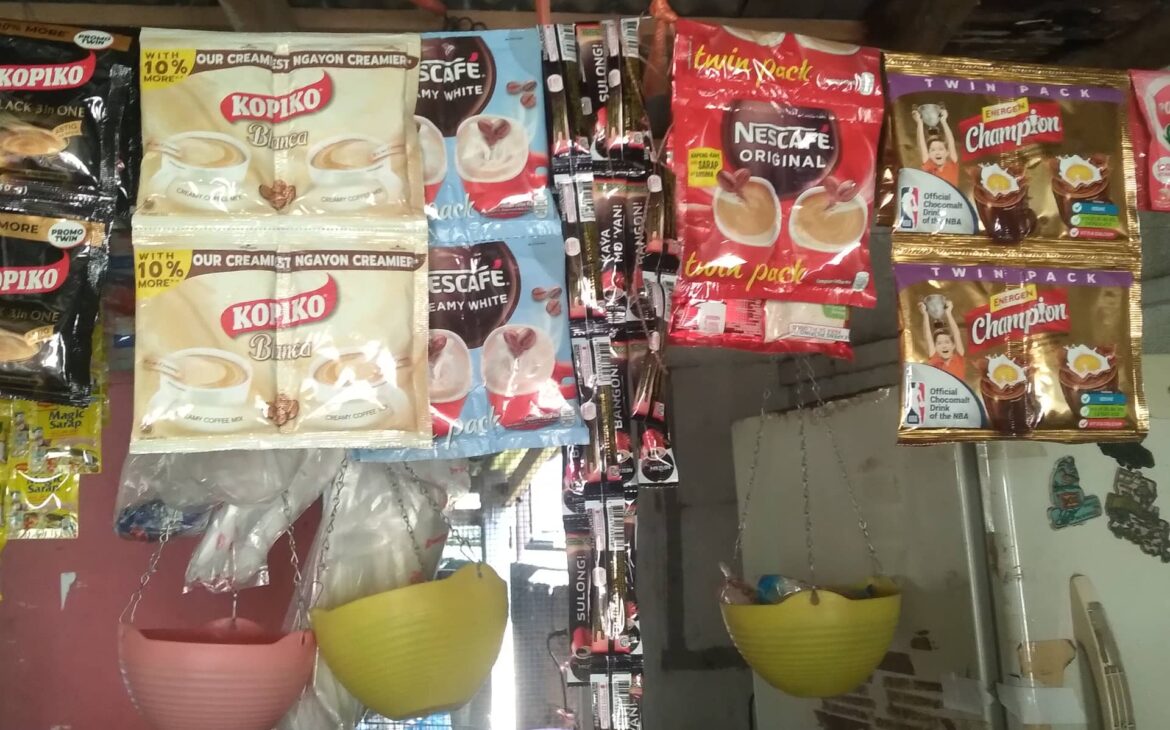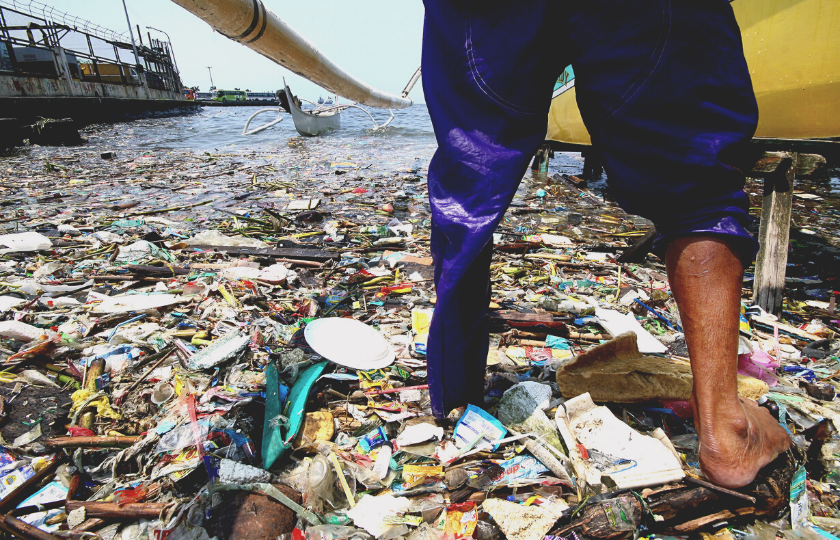Plastic sachets have fuelled a global waste crisis and are one of the biggest single-use plastics threats to the environment in many parts of the world.
Made from layers of plastic and aluminium, these sachets aren’t biodegradable and are almost impossible to recycle. They pile up in landfills, get stuck in oceans, choke waterways, and harm wildlife.
In 2018 alone, approximately 855 billion sachets were produced worldwide, only 10 per cent of which are collected and recycled.
Environmentalists say that the main culprits aren’t the consumers, but the corporations that continue to produce plastic packaging.
“They (companies) have money to do research that will remove the problematic packaging,” Sonia Mendoza, head of the Mother Earth Foundation, told Reuters.
The problem with plastic: big problems in small packets
Sachets are palm-sized pouches commonly used in condiments like ketchup or cosmetic samples in first-world countries.
However, sachets are rampant in developing countries where everything is packed in tiny packets – from shampoos to seasoning – for low-income households that can only afford to buy small quantities.
But despite numerous laws passed over the years to address the plastic waste problem and put sachet production to a halt, corporations manage to slip through the cracks and continue to manufacture products in sachet packaging for profit.
The sachet economy in Southeast Asia
Southeast Asia accounts for nearly half of the global sachet market and is predicted to grow yet further. The Philippines, China, Indonesia, Vietnam, and Thailand account for 60 per cent of the world’s marine plastic, producing 8 million tonnes of it each year.

In the Philippines, an estimated 3 million tonnes of plastic are produced yearly, with sachets accounting for 52 per cent. It doesn’t help that the country is composed of 7000 islands and lacks proper waste collection and recycling facilities.
The Ocean Conservancy reports that an estimated 20 per cent of plastic waste is in the country’s shorelines and oceans.
In Indonesia, meanwhile, 6 million tonnes of plastic are used and disposed of each year and – that volume is predicted to double within 15 years.
“Countries like Sri Lanka, India, and the Philippines have made several proposals to ban sachets, but corporations were able to maneuver around it once regulations were imposed,” a senior environmental official from the Philippines told Reuters. “In India and the Philippines, Unilever lobbied against proposed sachets ban, which lawmakers eventually dropped.”
Thes tiny packets provide some of Asia’s poorest population access to basic home items. It is said to be a strategy for multinational corporations to help improve sales by targeting clients who can’t afford larger quantities.
“Money is hard to come by, so I only buy sachets,” said Lisa Jorillo, 42, a mother of four who lives in a slum in Manila’s Tondo area, behind a beach blanketed by trash told Reuters
“It’s likely the garbage will still be there when my son grows up,” Jorillo said, referring to her four year old.
Corporate responsibility on the sachet crisis
Some corporations claim they are taking action against single-use plastics like sachets, with various initiatives from offsetting to faux phase-outs.
In 2019, Nestle, Danone, and Tetra Pak supported the 3R initiative but did not purchase plastic credits directly. Instead, the companies worked with projects from several countries that collect and recycle plastics equivalent to the quantity they produce in each country. According to Nestle, its biggest success so far has been in the Philippines.
“We achieved plastic neutrality in August 2020,” says Georgios Galanos, global head of packaging sustainability, Nestle. “Which means Nestle Philippines collected and co-processed the equivalent amount of plastic in the products sold.”
The company calls this strategy “one tonne in, one tonne out” and says it will use it to achieve plastic neutrality in 12 other countries in Asia, Africa, and Latin America.
Consumer goods giant Unilever has recently become a vocal critic of sachets.
In 2018, Unilever CEO Alan Jope announced his company would get rid of the tiny sachets it uses to sell single-use shampoo, toothpaste, and other essentials because of the pollution it creates.
Yet despite the company’s declaration to denounce its packet packaging, the multinational corporation has worked to bypass laws aimed at eliminating sachets in at least three Asian countries, Reuters reports.
Last year, Sri Lanka implemented new regulations to phase out sachets. But Unilever continued to sell tiny 6ml single-portion sachets of shampoo and hair conditioner, despite the new ban on plastic sachets 20ml or smaller, according to the country’s Ministry of Environment.
The corporation bypassed the laws by selling the sachets in sets and relabelling its 6ml sachets as one 24ml unit instead of four packs. Producing packets with easy tear-away seams, making it more convenient for buyers or small stores to detach a single portion.
London-based Unilever declined to comment on the company’s lobbying activities in these markets and said it adheres to Sri Lankan law.
The multinational also published an answer on its website on a page titled “Why do you continue to sell plastic sachets?” stating sachets allow low-wage earners an opportunity to afford its products.
“In several of our markets, plastic sachets allow low-income consumers an opportunity to buy small amounts of products – often ones that provide hygiene or nutrition benefits like shampoo, toothpaste and food – which they would otherwise not be able to afford,”
Potential solutions for the sachet crisis
Without clear and effective laws, environmentalists have been focusing on stopping or reducing sachet use at the grassroots level through partnerships with small businesses or encouraging local government initiatives to improve the collection and disposal of single-use plastics.
Some movements encourage consumers to patronise stores that offer refill services, much like what was done decades ago before it was phased out for plastic.
Laws and legislation
While there are currently national, regional, and international regulations on waste, none cover sachets.
A bill under consideration in the parliament of the UK would ban different types of single-use plastic and enforce a plastic packaging tax. The European Union has filed a lot that bans single-use plastic but doesn’t include sachets.
In the Philippines, under RA9003, companies are responsible for their waste, however it has not been updated to include sachets since its passage 12 years ago.
The 1989 Basel Convention, the international law on waste trade, took place before the sachet waste boom. Its amendment requires countries to consent before waste shipments are imported, and some government ministers are calling to strengthen the law – particularly with single-use plastics. Nations have endorsed the treaty, except for the US.
What’s next for the big problem with tiny packets?
Eliminating the use and production of plastic sachets seem like a herculean task. When you think about it, why do companies spend millions of dollars on clean-up and recycling when eliminating the problem at its roots presents a more sustainable solution?
Instead of continuously passing the blame on consumers for the never-ending plastic waste, maybe the purchasing stops when the production of plastic sachets does.



